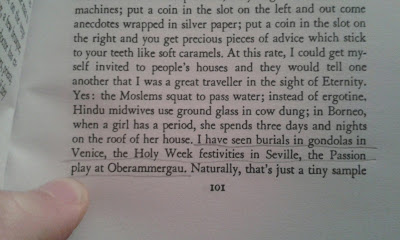Monday 30 November 2015
Sunday 22 November 2015
Book review: The Perpetual Motion Machine, Paul Scheerbart (1910)
I thought this story - account, actually, if its introduction is to be believed - of an obsessive attempt to design a perpetual motion machine, written by a man who apparently starved himself to death, was going to be an insight into a mind's gradual unraveling. But actually the madness here is not so much one of debilitation, more a sort of visionary if deluded genius. There are uncannily accurate musings on the future (the book was first published in 1910), such as of a "dissolution of homelands" and a "United States of Europe" (ok, we're not quite there yet, but almost); fantastic/terrible flights of fancy, such as of rearranging all of Earth's mountains for best aesthetic effect, insightful comments on literature (albeit briefly, don't buy it on that account alone); an amusingly glum view of humanity; and some top-notch aphorisms, like "Only in misery do great hopes and great plans for the future take shape."
It's also a lovely volume; Wakefield Press, based in Massachusetts, and translator Andrew Joron have done the world a service.
We voted for this
Will Hutton writes very powerfully about austerity in today's Guardian:
"To reduce the stock of the public debt to below 80% of GDP and not pay a penny more in income or property tax, let alone higher taxes on pollution, sugar, petrol or alcohol, is now our collective national purpose. Everything – from the courts to local authority swimming pools – is subordinate to that aim. [...] There is no economic or social argument to justify these arbitrary targets ..."
But towards the end of the piece, he asks: "Is this wanted, necessary or appropriate for these profoundly troubled times?"
Necessary or appropriate I'll leave aside, but wanted? Well yes, actually.
This is what we as a nation voted for in May's general election. Unlike the reorganisation of the NHS that David Cameron promised before the 2010 general election wouldn't happen, and unlike the cuts to child tax credits that David Cameron said this time around wouldn't happen, the Tories could not have been more upfront about their intention to cut deep and fast in the name of eliminating the national debt as soon as possible, and the nation duly awarded them a majority.
You or I might want libraries to stay open and a police force for all rather than just those who can afford to top it up, but more people wanted otherwise. So here we are.
Sunday 1 November 2015
Sartre, Bladerunner
The above is from Sartre's Nausea. Inspiration for the Tears in Rain speech in Bladerunner?
"I've seen things you people wouldn't believe. Attack ships on fire off the shoulder of Orion. I watched C-beams glitter in the dark near the Tannhäuser Gate. All those moments will be lost in time, like tears...in...rain. Time to die."
A stretch, perhaps. But how's this: Wikipedia says Rutger Hauer changed and shortened his lines in the take that was used without telling Ridley Scott what he was going to do; the original wording of the speech, it says, was supposed to begin with "I have known adventures...."
So? Earlier in Nausea, the narrator spends several pages musing on the nature of adventures and whether his life has or hasn't contained any...
So? Earlier in Nausea, the narrator spends several pages musing on the nature of adventures and whether his life has or hasn't contained any...
Talkin' 'bout your generation
If Halsey's generation was raised on Biggie and Nirvana, what does that say about music?
Halsey was born in 1994. Kurt Cobain died in '94, and Biggie would be slain three years later. By the time Halsey reached an age at which music starts to matter, both Nirvana and Biggie had long since ceased to be chart toppers.
I consider myself to have been raised on Biggie and Nirvana, and even I was at the trailing edge, having been born in '85.
For how long does an epoch-defining musician usually sustain their period of influence? The people I know who are roughly 10 years older than me were raised on bands like The Cure, The Smiths and New Order, whereas I and the people I grew up with - was raised alongside - listened to Biggie, Tupac and Snoop; Nirvana, Rage and the Red Hot Chili Peppers; Oasis, Blur and Pulp; The Prodigy, The Chemical Brothers and Massive Attack during our formative years.
Maybe Halsey referenced Biggie and Nirvana in New Americana as a grab at retro cool, but the question remains: why? I don't try to claim The Cure, The Smiths or New Order as my own. What happened to music in the mid-noughties to make a whole generation - or at least one singer speaking for that generation - turn away from it or want to disown it?
Subscribe to:
Posts (Atom)


